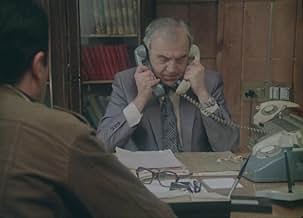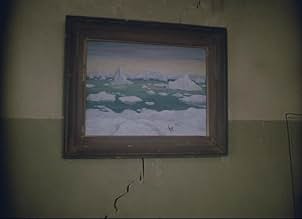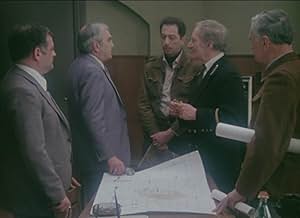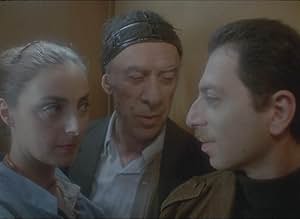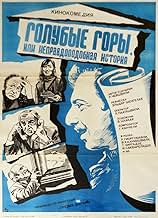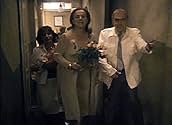Adicionar um enredo no seu idiomaAn author - a passive young man - enters the Soviet-controlled bureaucracy of Georgia attempting to get his novel published only to be neglected and compartmentalized at every turn.An author - a passive young man - enters the Soviet-controlled bureaucracy of Georgia attempting to get his novel published only to be neglected and compartmentalized at every turn.An author - a passive young man - enters the Soviet-controlled bureaucracy of Georgia attempting to get his novel published only to be neglected and compartmentalized at every turn.
- Direção
- Roteiristas
- Artistas
- Prêmios
- 1 vitória e 1 indicação no total
- Grisha
- (as V. Mezvrishvili)
- Mgebavi
- (as O. Guntsadze)
- Bella
- (as D. Sumbatashvili)
- Shuqri
- (as G. Chkhaidze)
- Otari
- (as Mikhail Kokodze)
- Chachanidze
- (as O. Shotashvili)
Avaliações em destaque
When it comes to humor, am I difficult to impress or is this not my type of humor? You tell me. I chuckled in my head maybe a few times, but other than that it was nothing impressive to warrant the ridiculously high ratings, currently 8.7 & 4.0, IMDB & LetterBoxd, respectively. Used repetition, running gags, in a proficient manner that made for an entertaining enough couple hours, but nothing to write home about!
A young author is trying to get his novel published, walking around the publishing house and delivering copies of his manuscript to different employees, who, despite the protagonist's persistence, eventually don't read it. This is the leitmotif. The reason his novel is not read by anyone is not bureaucracy - they just don't want to. These people are neither too busy, nor hostile or stupid communists who can't appreciate a talented young voice - we don't even know if the novel is any good; They don't want to do what they are currently destined to do, they are indifferent, so they procrastinate, follow other commitments, and sometimes blame bureaucracy (if no one reads the review at least I've learned how to spell this word). I'm not completely denying the portrayal of some problems caused by too much bureaucracy in this movie - especially the part about "removing Greenland", a kitsch painting barely hanging above a desk of an employee who's afraid it will eventually fall on him but can't remove it without a permission, which is not granted to him. However, it would be naive to assume that the enduring fame and appeal for this movie is a result of general audience's disdain of soviet bureaucracy.
Another thing some critics say is that the publishing house, walls of which crack and, ultimately, it collapses, is an allegory of Soviet Union. Allegedly, when Gorbachev saw this movie he told Shevardnadze that unless they do something about it, USSR is going to collapse as this building did. Today it seems like an obvious comparison as we know that USSR has in fact collapsed similarly to the building and this movie predicted it's fall. However, this is not how the movie ends. In the last scene, as we are shown the new building from the outside (new republic after the collapse, if we follow this allegory), where the publishing has moved, we hear the familiar angry voice shouting "remove it (meaning "Greenland")!". Back to the first point, I see this movie as a portrayal of attitudes of different people towards life and work and generally, the will of a man to be doing "something else".
Let's not forget what an amazing collaboration this movie is: film director Eldar Shengelaia working with one of the best XX century Georgian writers - Rezo Chkheidze on the script and soundtrack being written by Giya Kancheli - a composer known abroad chiefly as a contributor to modern classical music and in post-soviet countries as an author of unforgettable scores for movies. The cast consists of both award-winning actors and non-actors. "Blue Mountains" is very lovely. Sometimes I find myself looking for a single scene or a single line and then end up watching the whole movie.
L.E.: I got it! :D I have it on DVD! Wowwwidze!
Você sabia?
- CuriosidadesFinal film of Sesilia Takaishvili.
- Citações
Soso: When are you expecting him?
Mdivani: I don't know. He might come right now, might be late, might not come at all. Can I help you?
Markscheider: I'm here on the topic of fables.
Mdivani: Be for whatever you want to be. Don't you see? He's not here. Even if he was here, he could not see you in the first half of the day.
Markscheider: Can I wait until the second half of the day?
Mdivani: Of course!
Markscheider: Thank you.
Soso: You know, I will also wait.
Markscheider: I apologize, but if he won't come today, can I wait for him tomorrow?
Mdivani: Yes, of course, wait.
Markscheider: I won't disturb you anymore. From when to when does he have waiting hours?
Mdivani: From the morning till evening.
Markscheider: Thank you.
Mdivani: You are welcome.
Principais escolhas
- How long is Blue Mountains, or Unbelievable Story?Fornecido pela Alexa
Detalhes
- Data de lançamento
- País de origem
- Idiomas
- Também conhecido como
- Blue Mountains, or Unbelievable Story
- Empresa de produção
- Consulte mais créditos da empresa na IMDbPro

